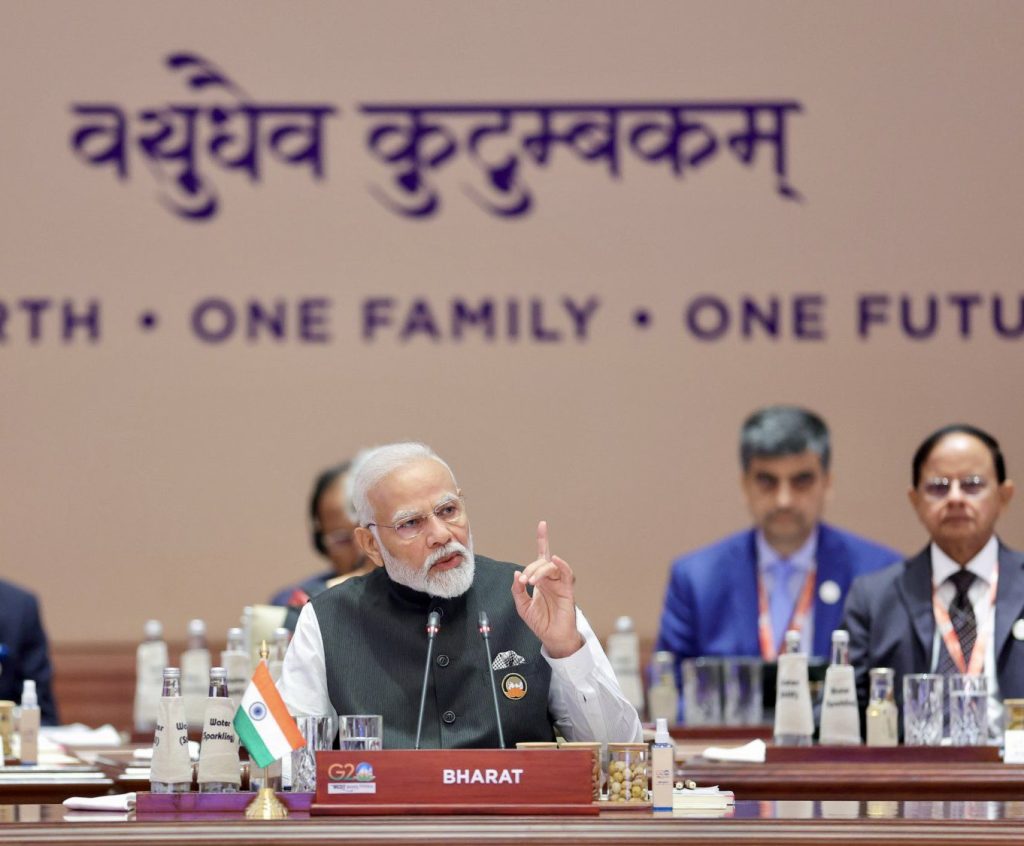
Inside the newly-created Bharat Mandapam, with the statue of the Dancing Shiva bearing sacred witness, history was made on a summer morning in New Delhi as the leaders of the world’s richest nations decided to admit the 55-nation African Union into their fold. As Prime Minister Narendra Modi invited AU Chair Comorian President Azali Assoumani to occupy his seat at the G20 high table, there was loud applause inside not only Bharat Mandapam – the majestic setting for the New Delhi summit – but also across capitals in African countries and the developing world.
Time for Africa
The formal inclusion of the AU as the 21st permanent member of the G20 has made the grouping more representative and future-ready, unveiling an emerging narrative of South-South solidarity and setting the tone for an ambitious and transformational New Delhi Declaration that was unveiled later in the day. The Declaration, which was reached after months of “intense and ruthless” negotiations and burning of much midnight oil by sherpas, was formally adopted at the summit, with PM Modi bringing down the gavel on the table.
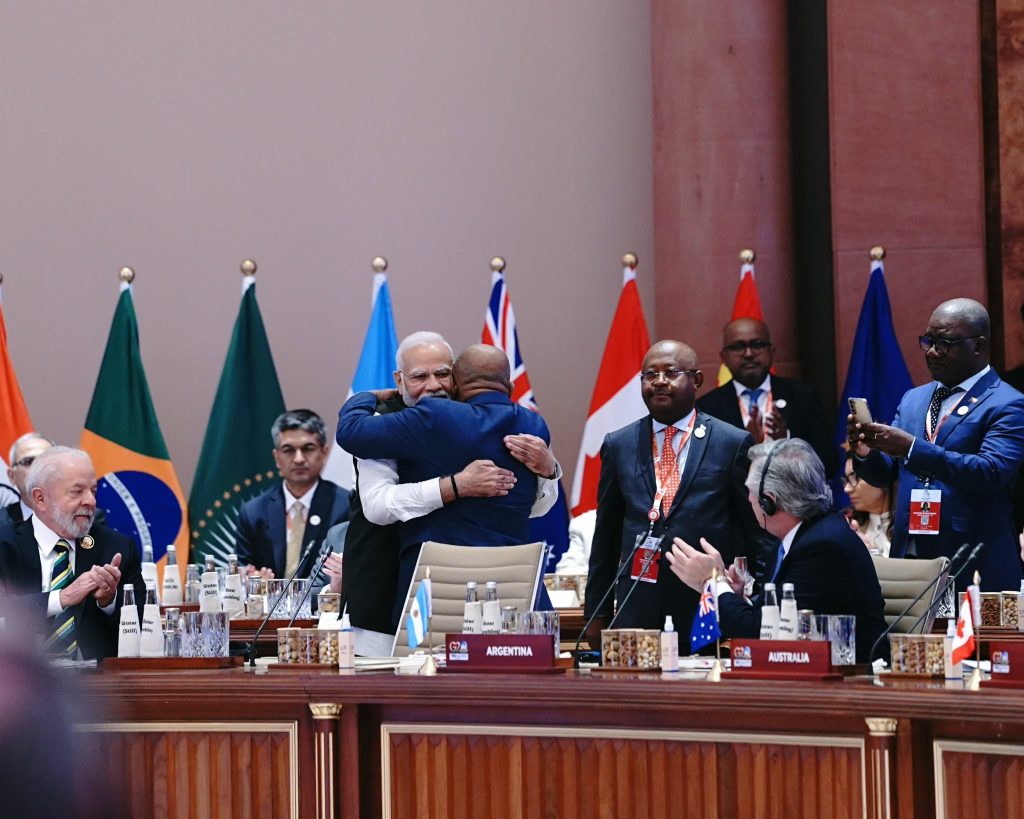
In the end, all that relentless hard work and resolve paid off as the leaders of all G20 countries displayed a rare show of team spirit and solidarity as they signed off on the G20 New Delhi Leaders’ Declaration, including the paragraphs on the Ukraine war, which proved to be the most contentious issue that if, not resolved in time, would have wrecked the Delhi summit.
“I have received good news. Due to the hard work of our team, consensus has been built on New Delhi G20 Leaders’ Summit Declaration. My proposal is to adopt this leadership declaration. I announce to adopt this declaration. On this occasion, I congratulate my Sherpa, ministers, who worked hard for it and made it possible,” PM Modi said. “It is my proposal that this G20 declaration be adopted,” the Prime Minister said. The declaration adopted with G20 leaders thumping their desks.
Resolving Ukraine Muddle
In a triumph for Indian diplomacy and bridge-building skills, the 83-para joint declaration succeeded in forging a consensus formulation on the Ukraine crisis while focusing on materializing pathbreaking initiatives for the Global South. The joint declaration does not even mention Russia and eschews any overt criticism of Russia for the war in Ukraine, but inserts a note of caution: “all states must refrain from the threat or use of force to seek territorial acquisition against the territorial integrity and sovereignty or political independence of any state.”
The New Delhi Declaration, however, “highlighted the human suffering and negative added impacts of the war in Ukraine with regard to global food and energy security, supply chains, macro-financial stability, inflation and growth.” In a clear sign that all differences were not resolved, the declaration contains a caveat: “There were different views and assessments of the situation.” Compared to the two paragraphs in the Bali summit, there were seven paragraphs in the New Delhi Declaration on the Ukraine issue.
G20 Team Spirit
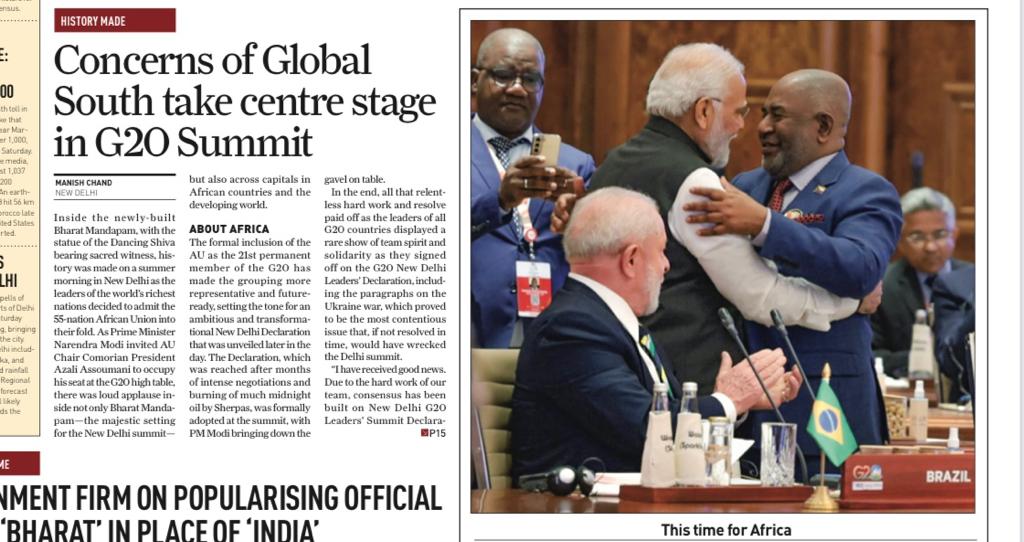
Setting the tone for the summit, PM Modi underscored the imperative for overcoming “this crisis of mutual trust.” Just as we can overcome COVID, we can also overcome this crisis of mutual trust. Today, as the President of the G-20, India invites the entire world to come together and, first and foremost, transform this Global Trust Deficit into global trust and confidence.
Addressing a press conference, India’s External Affairs Minister S. Jaishankar called the New Delhi Declaration the result of “collective work and collaboration of Team G20.” “It bears the imprint and vision of Prime Minister Modi,” stressed Dr Jaishankar.
In remarks that sought to dispel the growing impression of China’s obstructionist tactics, Dr Jaishankar struck a statesman-like tone, saying “China was very supportive of all the outcomes.”
India Imprint
India’s G20 Sherpa Amitabh Kant shared bits of the inside story, leading to the paragraphs on the Ukraine issue. “Brazil, South Africa and Indonesia played an important role in forging a consensus on the issue. Emerging markets played a pivotal role,” replied Mr Kant when asked about difficulties in forging a consensus. Significantly, IBSA countries (India, Brazil and Russia) had played an instrumental role saving the Bali Declaration from the Ukraine landmines, underlining the emergence of emerging world solidarity in G20 and in the international arena.
“The document was adopted with 100 per cent unanimity on all geopolitical and development issues, and without a single footnote,” said Kant. “It has a huge India footprint and a huge Indian narrative,” said a jubilant Kant, who led intricate negotiations from the front.
The summit’s key outcomes bear India’s imprint and included the adoption of the G20 Action Plan for accelerating SDGs, the adoption of the Green Development Compact, the transformative use of technologies to advance financial inclusion, the strengthening of Multilateral Development Banks (MDBs) to make them bigger and better, the launch of financial inclusion action plan, and productivity gains through Digital Public Infrastructure. Many key outcomes had a distinct Modi signature on it, including the Green Development Pact, the launch of Global Biofuel Alliance, the adoption of LiFE principles for sustainable development and the G20 action plan for accelerating SDGs.
Finance Minister Nirmala Sitharaman hailed India’s G20 presidency for “walking the talk” to achieve its finance track objectives. The key achievements of the finance track under the Indian G20 presidency include a plan to strengthen the Multilateral Development Banks (MDBs) to address shared challenges, laying down the building blocks for a globally coordinated policy and regulatory framework for crypto assets, gaining financial inclusion and productivity gains through digital public infrastructure, debt resolution for lower and middle-income countries, and financing cities of tomorrow, among others, the finance minister said.
Global South
The New Delhi Declaration may well prove to be the defining document of the growing primacy of the Global South in the international global agenda. Henceforth, the concerns and interests of the Global South will constitute the core agenda of G20, which will be reflected in the succeeding G20 presidencies of Brazil and South Africa.
The biofuel alliance will accelerate global efforts to meet net zero emission targets by facilitating trade in biofuels derived from various sources, including plant and animal waste.
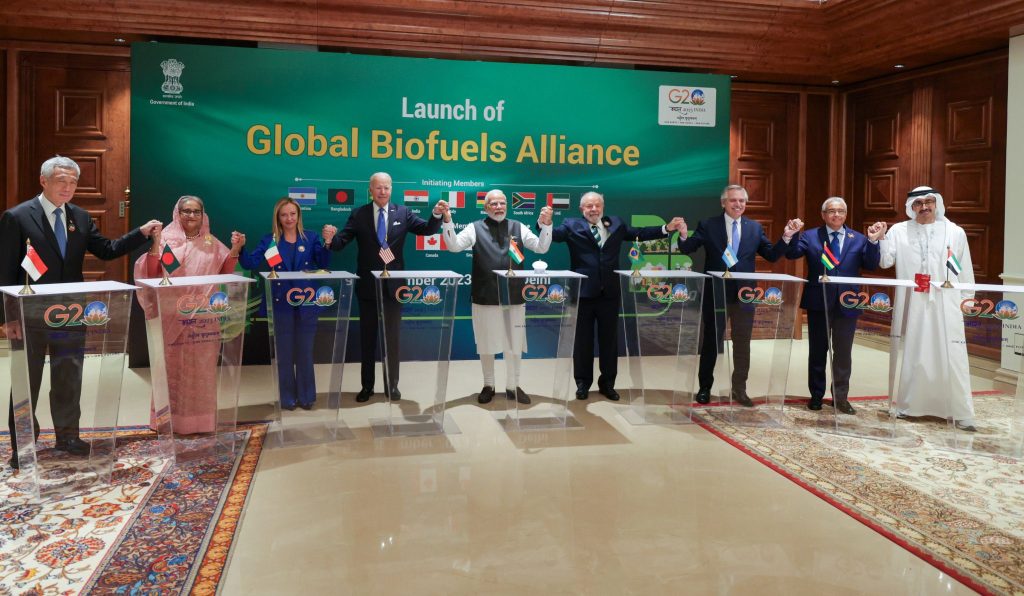
On climate action, there was significant progress as the New Delhi summit raised the bar for climate finance. “Trillions of dollars are required for an inclusive energy transition. Naturally, developed countries play a very crucial role in this,” said PM Modi.
“Along with India, all the countries of the Global South are pleased that developed countries have taken a positive initiative this year, in 2023. Developed countries have expressed their willingness to fulfill their commitment of 100 billion dollars for climate finance for the first time.”
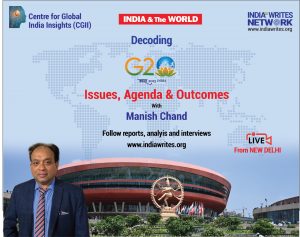
(Manish Chand is CEO, Centre for Global Insights India, a think tank focused on global affairs and India Writes Network. He is Editor-in-Chief, India and the World, a journal on international affairs. He has edited three volumes of essays on India’s G20 Presidency, including the Summit Edition of India and the World.)
Author Profile

- Manish Chand is Founder and Editor-in-Chief of India Writes Network (www.indiawrites.org) and India and World, a pioneering magazine focused on international affairs. He is CEO, Centre for Global India Insights, an India-based think tank focused on global affairs.
Latest entries
 India and the WorldFebruary 17, 2026South-by-South: Focus on people-centric solutions at India AI summit
India and the WorldFebruary 17, 2026South-by-South: Focus on people-centric solutions at India AI summit India and the WorldFebruary 7, 2026Modi hails interim India-US trade deal, Goyal says no concessions made on agriculture
India and the WorldFebruary 7, 2026Modi hails interim India-US trade deal, Goyal says no concessions made on agriculture India and the WorldFebruary 2, 2026Trump announces trade deal with India, Modi ‘delighted’
India and the WorldFebruary 2, 2026Trump announces trade deal with India, Modi ‘delighted’ India and the WorldJanuary 31, 2026Palestinian minister bats for mediatory role for India in ending Gaza conflict
India and the WorldJanuary 31, 2026Palestinian minister bats for mediatory role for India in ending Gaza conflict







